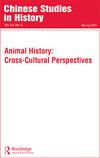“New Humanist” Confucianism: A study of Mei Guangdi of the Xueheng group
IF 0.2
4区 历史学
0 ASIAN STUDIES
引用次数: 0
Abstract
Abstract Amidst the intellectual tides of the May Fourth Movement, Mei Guangdi (梅光迪, 1890–1945) believed that a “truly modern person” was someone who could maintain their intellectual independence and Confucian flexibility under immense cultural pressure. Because of this, Mei Guangdi took the advice of his mentor Irving Babbitt and supported the study and interpretation of the modernity within core Confucian philosophies to promote the Chinese national essence and absorb new knowledge. Mei Guangdi’s theoretical framework for “New Confucianism” included “exploring Europe’s cultural roots and its reasons for growth” rather than “ridiculously abandoning two thousand years of Chinese history.” With the aid of “folk literature,” he outlined a basic framework of modern cultural transition for “New Confucianism” and a “New Confucian Culture Movement.” In terms of core principles, Mei Guangdi emphasized the “eternal value of Confucianism” while offering new modern interpretations of “ritual.” The transformation of the “New Confucianism Movement” could be seen in how the concept of “gentleman” (junzi) affected societal transformation. More concretely, it influenced how new intellectuals understood citizenship, the responsibilities and roles of scholars, and the development of Confucianism. This article examines how Mei Guangdi used a holistic approach to Confucianism to create proposals for China’s modern cultural transition.“新人文主义”儒学:学衡派梅光第研究
摘要在五四运动的知识分子大潮中,梅(梅光迪, 1890–1945)认为,“真正的现代人”是指能够在巨大的文化压力下保持思想独立和儒家灵活性的人。正因为如此,梅光棣听从恩师白比特的建议,支持对儒家核心哲学中的现代性进行研究和阐释,以弘扬中华民族的本质,吸收新的知识。梅的“新儒家”理论框架包括“探寻欧洲文化根源及其成长原因”,而不是“可笑地抛弃两千年的中国历史”,他借助“民间文学”为“新儒家思想”和“新儒家文化运动”勾勒出了现代文化转型的基本框架。在核心原则上,梅强调“儒家的永恒价值”,同时对“礼”提出了新的现代阐释。“新儒家运动”的转变可以从“君子”观念对社会转型的影响中看出。更具体地说,它影响了新知识分子如何理解公民身份、学者的责任和作用,以及儒家思想的发展。本文探讨了梅如何运用儒家思想的整体方法为中国现代文化转型提出建议。
本文章由计算机程序翻译,如有差异,请以英文原文为准。
求助全文
约1分钟内获得全文
求助全文
来源期刊

CHINESE STUDIES IN HISTORY
Multiple-
CiteScore
0.20
自引率
0.00%
发文量
5
期刊介绍:
Chinese Studies in History makes noteworthy works and important trends of historical study in the Chinese-speaking world available to English-language readers. Thematic issues present original papers or articles from academic journals and anthologies that have been selected for translation because of their excellence, interest, and contribution to scholarship on the topic. Topical coverage ranges over all periods and subfields of Chinese and East Asian history as well as more general theoretical and historiographical questions of interest to historians of many specialties. Each issue includes a substantive introduction by the editor or specialist guest editor.
 求助内容:
求助内容: 应助结果提醒方式:
应助结果提醒方式:


